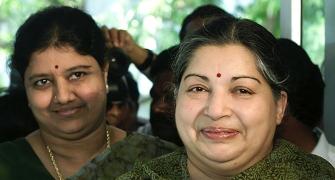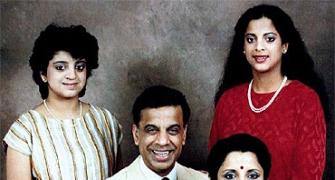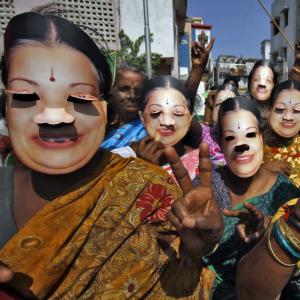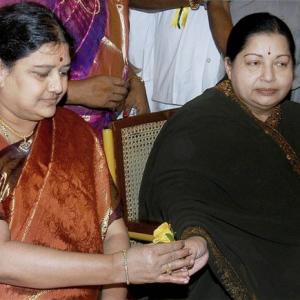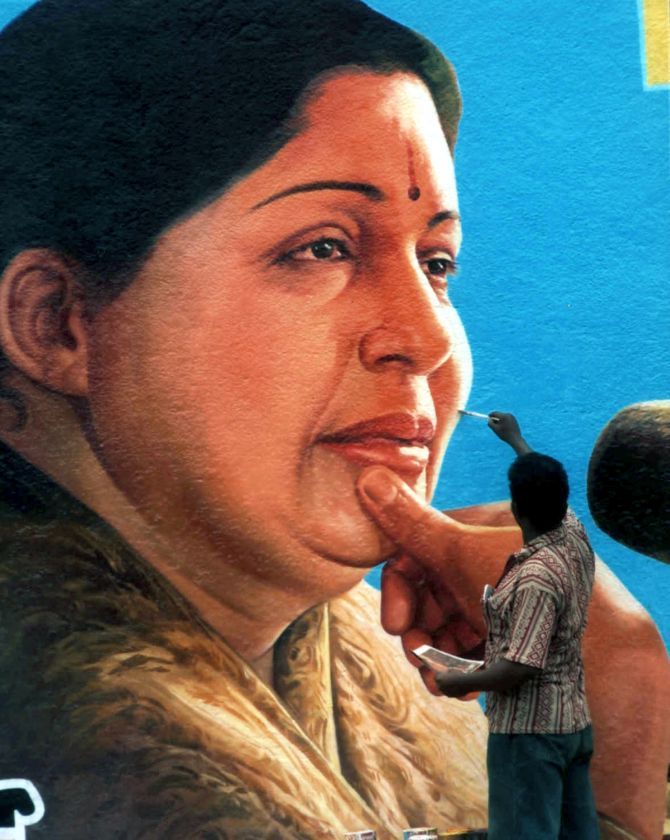
The clue to the what lies ahead for Tamil Nadu Chief Minister J Jayalalithaa, following the Karnataka government appealing in the Supreme Court her acquittal in a disproportionate assets case, may lie in a 2001 court case, writes R Ramasubramanian.
The much-awaited event in Tamil Nadu politics happened on Tuesday as the Karnataka government filed an appeal in the Supreme Court challenging the acquittal of Chief Minister J Jayalalithaa and three others in the Rs 66.65 crore disproportionate assets case.
On September 27, 2014, special judge Michael John D’Cunha convicted Jayalalithaa and three others to four years imprisonment and imposed a fine of Rs 100 crore on the CM and Rs 10 crore on the three other accused in the case.
However, Justice CR Kumarawamy of the Karnataka high court overturned the ruling and acquitted all the four in this 19-year-old case on May 11 and also ordered that their attached properties be returned to them.
But while doing so, the judge did not seem to have done his mathematics properly, leading to what the prosecution felt was an error in calculation. The judge quoted a much older SC order, which ruled that no offence is made out if the disproportionate assets were found to be less than 10 per cent of the income.
Justice Kumaraswamy found Jayalalithaa and the others had amassed an income of 8.12 per cent more than their actual income, while the actual percentage added up to 76.7 per cent more as per the tabulations in his judgment.
The state of Karnataka therefore, in its over 2,500-page appeal, made a strong case not only for the reversal of the judgment, but also pleaded to the court to immediately stay the Karnataka high court’s judgment. Describing the acquittal as a “gross miscarriage of justice”, the lengthy appeal says that the judgment was nothing but “cryptic; lacks reasoning and is illogical”.
The Special Leave Petition was filed in the vacation court as the SC is on summer leave. The Karnataka government is the sole prosecuting agency in the case as a three-judge bench of the Supreme Court headed by Justice Deepak Mishra in its April 27, 2015, ruling put a full stop to all the ambiguities in the issue.
The Justice Mishra bench, while striking down the appointment of special public prosecutor Bhawani Singh, who was appointed by the Directorate of Vigilance and Anti Corruption of the Tamil Nadu government, as null and void, ruled that hereafter the state of Karnataka will be the sole prosecuting agency in the case.
The Karnataka government, after some hesitation in the aftermath of the May 11 judgment, finally decided to file an appeal on June 1 in the case -- its effort visible in the 2,500-page documentation.
The 82-year old senior counsel BV Acharya, who is the special public prosecutor, is expected to argue the case in the Supreme Court.
The million dollar question now is about how the case will unfold in the Supreme Court. The SLP is expected to come up for hearing immediately after the SC reopens after vacation in July.
Seasoned legal opinion is that the SC is highly unlikely to stay the Karnataka HC’s judgment, because generally acquittals are never stayed. But what will happen to the SLP? Will the case drag on for years or will there be a time-bound disposal in the apex court?
A Tamil Nadu government lawyer, pleading anonymity, told Rediff.com, “You cannot predict what will happen in the Supreme Court. Though the chances are very slim for a stay, since this is an extraordinary case, if SC grants a stay on the acquittal order, it will mean Jayalalaithaa will be disqualified once again. This will bring in the status quo ante of May 11, 2015 (going back to the earlier situation) before Justice Kumarawamy exonerated her. This means she will have to go to jail.”
Another leading lawyer concurs, but says, “The SC may restore the conviction, but will suspend the sentence and grant bail to all four till the matter is disposed of in the court, because the stakes are very high for the court. The Karnataka HC judgment is a case law, which means on the basis of the citation there can be acquittals across the country in hundreds of corruption case pending in courts. So, if the SC does not stay the judgment, then it has every danger of opening the floodgates.”
The third option is that the SC may not grant a stay, but will fix a time-bound appeal process and thus deliver its final verdict within a stipulated period.
There is a fourth option, which is that the SC may admit the SLP and slap notices on Jayalalithaa and the others and the matter will then drag on and on for years together in court.
Naturally, everyone is clueless about how the saga will unfold in the Supreme Court; as sitting judge, Justice Madan Lokur, while hearing this case in April opined, “This (Jayalalithaa case) has taught a lot of things not only to lawyers, but also to us (judges)”. The fact that the case dragged on for 19 years probably weighed in on the judge.
In an identical situation 14 years ago, Jayalaithaa was forced to step down when a five-judge Constitution Bench of the SC struck down her appointment as chief minister.
In 2001, the AIADMK had won the Tamil Nadu assembly elections and Jayalalithaa became chief minister. But she was not an MLA at that time as she was barred from contesting the polls because she was convicted in the Tansi Land deal case.
The Dravida Munnetra Kazhagam had then approached the SC challenging her appointment as CM, pleading how could a person who was not even an MLA become a CM. A five-judge bench of the SC headed by Chief Justice of India Justice SP Bharucha, struck down Jayalalithaa’s appointment as CM as constitutionally null and void on September 21, 2001.
But she won the Tansi case in an appeal in the Madras high court and later came back as CM in March, 2002, but that is another story. Today the moot question is, will history repeat itself?
Today, the opposition DMK and the Congress in Tamil Nadu have welcomed the Karnataka government’s decision to file an SLP. The Paattali Makkal Katchi has demanded the immediate resignation of Jayalalithaa on moral grounds. But both Amma and the AIADMK are unfazed. For now, the party and its chief are busy with the upcoming bypolls in the RK Nagar constituency in north Chennai scheduled for June 27.

